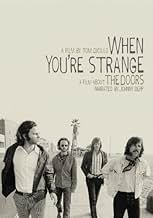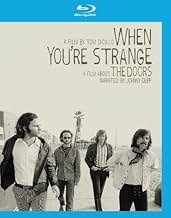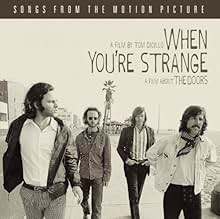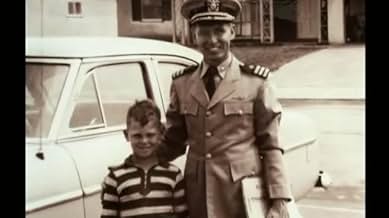A look at the late '60s and early '70s rock band The Doors, including rare exclusive footage.A look at the late '60s and early '70s rock band The Doors, including rare exclusive footage.A look at the late '60s and early '70s rock band The Doors, including rare exclusive footage.
- Awards
- 2 wins & 1 nomination total
Johnny Depp
- Narrator
- (voice)
John Densmore
- Self
- (archive footage)
Robby Krieger
- Self
- (archive footage)
Ray Manzarek
- Self
- (archive footage)
Jim Morrison
- Self
- (archive footage)
Pamela Courson
- Self
- (archive footage)
- (as Pam Courson)
The Doors
- Themselves
- (archive footage)
Murray Goodman
- Self - Judge
- (archive footage)
Jimi Hendrix
- Self
- (archive footage)
Lyndon B. Johnson
- Self
- (archive footage)
- (as Lyndon Johnson)
George S. Morrison
- Self - Jim's father
- (as Admiral George S. Morrison)
Paul A. Rothchild
- Self
- (archive footage)
Adolf Hitler
- Self
- (archive footage)
- (uncredited)
Janis Joplin
- Self
- (archive footage)
- (uncredited)
John F. Kennedy
- Self
- (archive footage)
- (uncredited)
Robert F. Kennedy
- Self
- (archive footage)
- (uncredited)
- Director
- Writer
- All cast & crew
- Production, box office & more at IMDbPro
Storyline
Did you know
- TriviaFor the first time in the band's history unprecedented access was granted, regarding the previously unseen footage of Jim Morrison.
- GoofsA mock newspaper clipping announces both that Sharon Tate and her friends have been found murdered and that Charles Manson and his "Family" are suspected. Manson and the "Family" were not identified as the Tate killers until December 1969, more than four months after the murders happened.
- Quotes
Jim Morrison: The music can't help but reflecting things that are happening around you
- ConnectionsEdited from Feast of Friends (1969)
Featured review
As an avid Doors fan for more than 40 years, and with the vast growth of the DVD/Video market and the enormous reservoir for footage that the Internet and YouTube have, I have seen almost all there is to see of The Doors. That includes Jim Morrison's own films "A Feast of Friends" and "HWY," footage from which is contained in "When You're Strange." And most everyone has seen some things on "When You're Strange," such as the scene of The Doors descending from the stairs of an airplane on their European tour, and the bright-eyed look when Jim turns and identifies himself as "Jim."
But setting that aside, this documentary film contains considerable behind-the-scenes and archival footage that I have never seen. The tone is set early with scenes of Jim driving a car through a desert. His own home movie, Doors-like atmosphere, and dialogue. And yes, there are a lot of scenes with the group together, on the road, and interacting, as well as context shots, of locations and other things. The Miami Incident? I must confess, while some people writing about this movie say it gives you a definite answer of what happened, that is not true of this viewer; actually, I don't think anyone will ever know for sure. Still, it has a good presentation.
But the narrative, the commentary? Sorry, it leaves something to be desired. It was very superficial. To have something new and insightful for a hard core fan like myself would be challenging, but still viable. However, I believe it is accurate to say that even for casual fans who know just the basics, there are no revelations. There is certainly nothing on the songwriting process, which some of the more recently released DVDs have some discussion on. Narrator Johnny Depp's words are just the same old story.
It is time for Ray Manzarek to take it upon himself to conceptualize a film containing the very elements whose absence from the Oliver Stone film he used as a basis for criticizing it: namely, Jim's fascination with various French and other literary and theatrical figures. We know many of those names: Rimbaud, Nietzsche, Blake, Artaud, Baudelaire, beat writer Jack Kerouac, and of course Celine: "Take a Highway to the End of the Night." Fans of Jim know, from the many books about him and The Doors, that he memorized many passages of his favorite authors and would challenge visitors to his dorm room to read him the passages so he could cite the page numbers, which could make for a great scene. He was really absorbed. The film could convey how those influences shaped Jim and contributed to his writing of the great songs from The Doors powerful first two albums, The Doors and Strange Days; a few songs on later albums; and his poetry. This could be combined with other elements, including Jim's acid trips in the days when he was sleeping on the Venice rooftops and seeing "television skies." I am surprised that Director Tom DiCillo did not try to find a way to include some of this in his film, whose audience would be looking for something new.
But setting that aside, this documentary film contains considerable behind-the-scenes and archival footage that I have never seen. The tone is set early with scenes of Jim driving a car through a desert. His own home movie, Doors-like atmosphere, and dialogue. And yes, there are a lot of scenes with the group together, on the road, and interacting, as well as context shots, of locations and other things. The Miami Incident? I must confess, while some people writing about this movie say it gives you a definite answer of what happened, that is not true of this viewer; actually, I don't think anyone will ever know for sure. Still, it has a good presentation.
But the narrative, the commentary? Sorry, it leaves something to be desired. It was very superficial. To have something new and insightful for a hard core fan like myself would be challenging, but still viable. However, I believe it is accurate to say that even for casual fans who know just the basics, there are no revelations. There is certainly nothing on the songwriting process, which some of the more recently released DVDs have some discussion on. Narrator Johnny Depp's words are just the same old story.
It is time for Ray Manzarek to take it upon himself to conceptualize a film containing the very elements whose absence from the Oliver Stone film he used as a basis for criticizing it: namely, Jim's fascination with various French and other literary and theatrical figures. We know many of those names: Rimbaud, Nietzsche, Blake, Artaud, Baudelaire, beat writer Jack Kerouac, and of course Celine: "Take a Highway to the End of the Night." Fans of Jim know, from the many books about him and The Doors, that he memorized many passages of his favorite authors and would challenge visitors to his dorm room to read him the passages so he could cite the page numbers, which could make for a great scene. He was really absorbed. The film could convey how those influences shaped Jim and contributed to his writing of the great songs from The Doors powerful first two albums, The Doors and Strange Days; a few songs on later albums; and his poetry. This could be combined with other elements, including Jim's acid trips in the days when he was sleeping on the Venice rooftops and seeing "television skies." I am surprised that Director Tom DiCillo did not try to find a way to include some of this in his film, whose audience would be looking for something new.
- Cineleyenda
- May 27, 2010
- Permalink
- How long is When You're Strange?Powered by Alexa
Details
- Release date
- Country of origin
- Official site
- Language
- Also known as
- The Doors. When you're strange
- See more company credits at IMDbPro
Box office
- Gross US & Canada
- $246,078
- Opening weekend US & Canada
- $66,833
- Apr 11, 2010
- Gross worldwide
- $1,194,182
- Runtime1 hour 26 minutes
- Color
- Sound mix
- Aspect ratio
- 1.85 : 1
Contribute to this page
Suggest an edit or add missing content


































